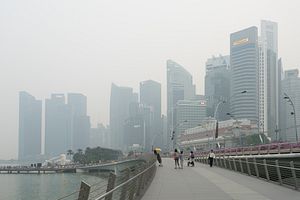The return of the haze to Singapore has brought the predictable round of complaints, analysis, hang-wringing, and soul-searching, but the problem never seems to improve. To establish a basis for actionable intervention, it is critical to link policy solutions with evidence about the health impacts of the haze – on residents of Indonesia. However, exacerbating these challenges are patterns of behavior that are beyond the reach of government. Effective solutions will materialize only after an evolution in Indonesia’s popular and political attitudes regarding forest burning.
One way to interpret the haze challenge is as an economic development and poverty issue. Lacking attractive alternatives to land clearance, farmers opt for the most expedient solution available. This is the same rationally self-interested calculus that people undertake daily before almost any decision. In burning vegetation, farmers pursue what they believe is the best available alternative, regardless of the longer-term costs to a distant and wealthy island. Economists would describe the haze as a negative externality – the unwanted impact of an action on parties (e.g., citizens and states) that have no opportunity to negotiate against it.
In 1965, Singapore was a poor cousin to Indonesia. Now, Singapore is the wealthy and influential cousin (and one for whom few have sympathy). Many Indonesians probably fail to believe that they should sacrifice their own often fragile livelihoods to appease a highly developed neighbor. Unfortunately, the haze problem has been cast as a burden primarily on Singapore, but it also negatively affects Indonesia itself. Based on a pattern of policy inaction, one is tempted to assume that Indonesia either is reluctant to acknowledge the impact on its own people, or refuses to believe haze is a problem worth serious attention. Some farmers may actually understand the negative impact on broader Indonesian society but still refuse to change their behavior.
Therefore, Singapore is asserting negotiating power by pressing Indonesia for legislative action. Despite repeated apologies from its presidents, including Suharto in the late 1990s, Indonesia’s parliament spent more than a decade refusing to support a 2002 ASEAN pact to prevent forest burning; it was finally ratified last year. Even if Indonesia agrees to further anti-burning measures or name-and-shame efforts against blameworthy firms, such policies stand little chance of being effectively implemented. As history indicates, many Indonesian legislative actions – addressing everything from corruption to pollution – have failed to generate substantive change. The same would likely happen to haze management legislation.
To make progress solving this complex and recurring challenge, the Indonesian public must be convinced that haze is bad for them, and this begins with credible evidence. There is currently no published study that estimates the cost of haze to Indonesia in terms of health, productivity, or FDI (as has already been done for Singapore and Malaysia). Investors may avoid the country for concern not only about macroeconomic conditions, inadequate infrastructure, and traffic congestion, but also about environmental issues such as water and air pollution. Indonesia’s young population needs hundreds of thousands of new jobs created each year, requiring sustained FDI. This effort will be compromised unless environmental and economic conditions are substantially improved, and political pressure to address such concerns will be minimal without greater public awareness.
To address the indirect causes of haze commonly discussed, there are few feasible policy options. A 2014 paper by NUS researchers describes several factors worsening the haze challenge, including resource-exploitative growth policies and weak forestry governance (regulatory enforcement and property rights). Diplomatic pressure is unlikely to change the first, and improving the second is doubtful without political support. For example, it is unlikely that Indonesia will agree to strict and binding regional agreements that limit growth policy options or expose citizens to legal action. Spot-solutions, such as Singapore’s offer of helicopter support to douse fires or Indonesia’s recent declaration of a state of emergency, generate splashy headlines and give the impression of progress, but target only the symptoms.
As such, the policy battlefield should now move from the banquet tables of regional summits to the hearts and minds of Indonesian citizens. Winning their support for stricter regulation and enforcement is a bipartite strategy. First, an effort must be made to gather data and generate robust evidence about the domestic impacts of Indonesian haze. Singapore can turn to its own world-class universities and research centers to conduct such studies. Second, the findings must be expressed in an easily understood way and disseminated widely through the media and other conduits. This should not be a one-off publicity blast, but a sustained awareness initiative that targets the general public and enlists the support of advocacy groups, NGOs, and ultimately (through domestic political pressure) government officials.
Public understanding of the haze crisis in Indonesia should be as common as basic literacy, and at least as embedded as the public’s knowledge of common health and safety issues such as pesticides, smoking, and sanitation. This may not produce the instant solution some believe would result from aggressive diplomatic action like boycotts and sanctions. However, haze mitigation interventions would be far more durable across political cycles because increased awareness often leads to deeply rooted interest in a policy issue. Indeed, an educated public is the most powerful force for change.
Asit K. Biswas is Distinguished Visiting Professor at the Lee Kuan Yew School of Public Policy, National University of Singapore. Kris Hartley is a doctoral candidate at the Lee Kuan Yew School of Public Policy, National University of Singapore.

































